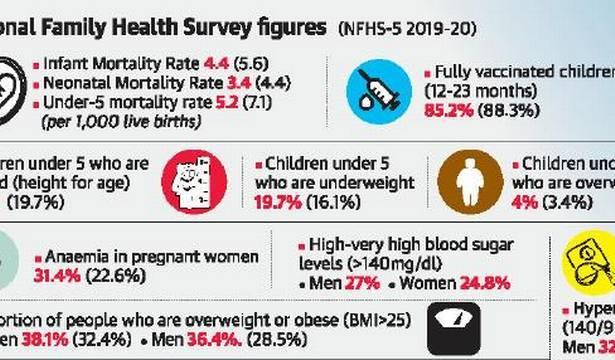Governance
More
hospital births, but limited gains in childhood nutrition: NFHS
·
The NFHS provides estimates on key
indicators related to population, family planning, child and maternal health,
nutrition, adult health, and domestic violence, among others.
·
Key Findings Population Use of birth
control strategies increased; most states reduce their birth rate, below the
target of two.1 Sex magnitude relation at birth has declined in a few states –
Sex ratio at birth for kids born within the last 5 years is below 950 for seven
(of the 17) states.
·
Health and Nutrition Institutional
births have increased -In seven states,
over ninetieth of the births within the last 5 years were institutional births.
·
Out of pocket expenditure on deliveries
increased in some states infant
mortality Rate has declined across states; but, hungriness among kids is
increasing. stunting or chronic malnutrition (i.e., low height with respect to
age) has increased in eleven of the
seventeen states.
·
Proportion of severely wasted kids has
increased in thirteen of the seventeen
states. Wasting or acute under-nutrition refers to low weight with respect to
height.
·
Children who are stunted or wasted are
additional vulnerable to diseases and unwellness.
·
Obesity is rising for both men and women
across all states.
·
Access to infrastructure Access to
electricity, improved source of drinking water and sanitation facility has
increased.
·
More women using mobile phones across
all states; however, many of them do not have access to internet.
·
More women using bank accounts;
ownership of house/ land amongst women declines in several states.
·
Gender related indicators Use of
hygienic methods of protection during menstrual period has increased across
states.
·
Gender based violence still remains
high, has increased in some states.
regarding National Family Health Survey (NFHS) The National Family Health
Survey (NFHS) could be a large-scale, multi-round survey conducted in a
representative sample of households throughout India.
·
The Ministry of Health and Family
Welfare (MOHFW), Government of India, selected the International Institute for
Population Sciences(IIPS) Mumbai, because the nodal agency, responsible for
providing coordination and technical guidance for the survey.
·
IIPS collaborated with a number of Field
Organizations (FO) for survey implementation.
·
Each FO was responsible for conducting
survey activities in one or more states covered by the NFHS.
·
Technical assistance for the NFHS was
provided mainly by ICF (USA) and other organizations on specific issues.
·
The funding for various rounds of NFHS
has been provided by USAID, DFID, the Bill and Melinda Gates Foundation,
UNICEF, UNFPA, and MOHFW, GOI.


Comments